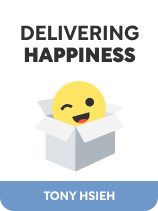

This article is an excerpt from the Shortform book guide to "Delivering Happiness" by Tony Hsieh. Shortform has the world's best summaries and analyses of books you should be reading.
Like this article? Sign up for a free trial here .
Did you know that happy workers are more productive? How can you create a work environment that increases happiness and encouragement?
According to Tony Hsieh, the former CEO of online clothing retailer Zappos, happy workers lead to happy customers, which maximizes profits for your business. There are three reasons why employee satisfaction leads to harder work: friendship, empowerment, and financial security.
Continue reading to learn more about these three reasons so you can create a happy, healthy environment for your workers.
Zappos Encourages Happiness
Zappos sets itself apart from its competitors through a culture devoted to making its employees happy. Hsieh believes that by making its employees happy, Zappos will naturally fulfill its other objectives of great customer service and continued success.
1. Happy Workers Have Work Friendships
Employees who are friends with their coworkers are happier, which inspires them to do better work and makes the office environment more enjoyable. In addition, employees that are friends work better together during difficult times.
Zappos nurtures this culture of friendship in several ways. First, Zappos encourages employees to be themselves, letting their true personalities and interests shine through, Hsieh states. Having a blend of personalities and interests in your team makes work more enjoyable, and employees who don’t have to put on a persona at work are more comfortable and eager to work.
(Shortform note: Encourage your employees to be authentic by learning about their interests and engaging those interests at work. For example, if one of your employees is a stand-up comedian, encourage them to give engaging, humorous presentations. Also, model authenticity yourself: Be open about your personality and interests so your employees feel safe doing the same.)
Second, Zappos encourages employees to have fun at work. Having fun increases enthusiasm and happy workers, Hsieh says. This boost to productivity makes up for any time fun activities may take away from work.
(Shortform note: Both Zappos’s success and other authors support Hsieh’s dedication to employee happiness. In The Infinite Game, Simon Sinek agrees that happier employees work harder and create better results: By prioritizing your employees over profits, you inspire them to care for the company in return. This means they will freely devote more time and effort to making the company successful.)
2. Happy Workers Are Empowered
One of the things employees need to be happy and productive—and that Zappos provides—is trust and empowerment to make decisions, Hsieh argues. The employees on the “front lines” of a department are usually the best equipped to understand and handle that department’s problems, and their work ethic improves if they’re happier. Workers who are supported, along with their suggestions, show that you respect them and empower them to solve problems faster.
As discussed, Zappos makes it a top priority to keep its employees happy. Employees are happier and more willing to work when they’re learning and improving themselves, so helping employees do so is an important part of fulfilling this goal.
(Shortform note: How does learning make you happy? Raph Koster explains in A Theory of Fun For Game Design that “fun” is a burst of dopamine you receive when learning something new or mastering a skill. Dopamine generates pleasure and motivation, so learning something new, as Zappos encourages, directly contributes to happiness.)
3. Happy Workers Have Financial Security
Another thing employees need to be happy and productive is financial security. Zappos outdoes its competitors in supporting its employees’ financial security in several ways. One of the most well-known examples is its four-week probation period. If employees quit during this time, they receive a $2,000 bonus. This incentive ensures that people stay at Zappos because they want to work there rather than staying out of necessity because they can’t afford to search for another job. This policy inspires and impresses employees, Hsieh explains, and fewer than 1% of employees take the offer.
In addition, companies are only as good as their employees, Hsieh explains. Your company can’t grow and improve unless your employees do as well because they’re the ones operating the business. Thus, to keep innovating and maintain your company’s success, support innovation and success to ensure happy workers.
(Shortform note: Hsieh says companies are only as good as their employees and uses this as justification for continual employee education. Others take this idea a step further, saying your company is only as good as your worst employees. Thus, improve the quality of your company by focusing your evaluations and training on your weakest employees specifically. They have more improvements to make, so focusing on them will likely improve your company and profits faster than giving the same amount of training and attention to every employee. In addition, your worst employees are probably also the most unhappy, and focusing on them will increase their morale.)

———End of Preview———
Like what you just read? Read the rest of the world's best book summary and analysis of Tony Hsieh's "Delivering Happiness" at Shortform .
Here's what you'll find in our full Delivering Happiness summary :
- Former Zappos CEO Tony Hsieh's guide to workplace happiness
- The three principles that turned Zappos into a billion-dollar company in a decade
- An exploration of the psychology behind happiness and why it leads to success






